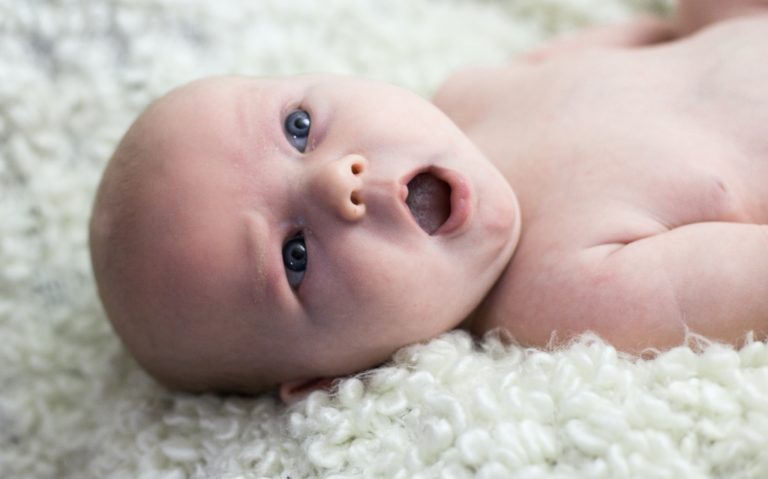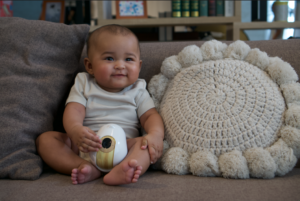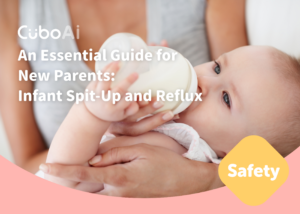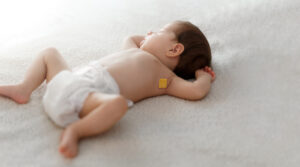Table of Contents
After following your pregnancy week-by-week, you’ll also be excited to see your baby’s first year of development now that they’re here and growing right in front of your eyes. In the first few years, everything is so new, it’s as if you get a new milestone every day. At least, it might seem like it.
Your baby’s first smile, first locked-eyes moment, first sit-up or roll-over may seem like forever away, but really they’re just around the corner. Knowing when to expect them and how they might look at first can allow you to help them achieve these developmental milestones and capture them to remember forever.

What is baby’s first milestone?
Milestones are actually different from your baby’s abilities. Think of milestones as achievements reached in their development. They’re set and defined by the American Academy of Pediatrics.
Essentially, they’re first-times for skills your baby should reach and they’re given an average age at which they tend to happen. If your baby for any reason doesn’t reach these milestones in that timeframe, it could be ok! Talk to your pediatrician about how to stimulate your baby’s growth.
In your baby’s first month, it’s hard to know what their very first milestone will be, but there are a few things you’ll notice.
- They will notice and follow faces with their eyes
- They recognize your voice
- They make coo-ing sounds
- They bring their hands near their eyes and mouth
- They move their head from side to side when lying down
The 5 development stages
Your child will go through 5 main ages of development through which you can check off some developmental milestones. Some of these terms sometimes are often blurred and mixed up between parents, but officially, all children will go through the following stages.
Newborn
Your child is a newborn for the first 12 weeks of life, which is also sometimes called the fourth trimester both for mom and baby.
Infant
Though they’ll always be your baby, your little one is only an infant for the first year of life.
Toddler
Once your infant turns one (which will come so fast!) they’re officially a toddler. Though you may not be emotionally ready for how fast they’re growing, they’re definitely ready for the milestones that come during this time including following simple instructions and using short sentences.
Preschool
Between age 3-5 kids are all about motor skills. This is why, at preschool, your little one will be asked to put their own shoes on, take off their jackets and put them back on, skip, hop, throw a ball, etc. It’s not just for fun and gathering discipline, all of these exercises are little milestones.
School Age
From age 6-12 your kids are “school-age children”. We know what you’re thinking, Won’t they keep going to school after 12? We hope so! But as far as developmental stages, this is when you’ll be watching for their peer relationships and how they take on responsibility, independence, and confidence.
As fun as all of these stages will be, today we’ll only be going through the first year of your baby’s milestones.

Important Baby Milestones:Your child’s first year of development
The first six months
-
Month 1
2-week-old baby development milestones already include focusing on faces! Your little one might just be eating and sleeping a lot (more on newborn sleep here) but they’re working hard, too!
If you’ve ever discussed your birth weight with friends, you know that these vary by a lot. Some babies are born at 7 lbs, others at 10 lbs! Neither is more healthy than the other. On average, a 1-month-old should be anywhere around 5 lbs 11.5 oz and 8 lbs 5.75 oz. (maybe more!)
-
Month 2
- Smiles at people
- Self-soothes (with pacifiers and/or hands)
- Follows things with eyes, can recognize loved ones at a distance
- Gets bored and fussy after too much of the same activity
- Holds their own head up
- Starts pushing up when lying on tummy
- Moves arms and legs more smoothly
-
Month 3
-Distinguishes your face
- Cries vary for different needs
-Turns head away when bored
-Turns towards sounds
-Opens and closes hands
-Swipes at objects
-Loves playing! (maybe crying when playtime is over)
-
Month 4
- Giggles and laughs
- Starts to mimic close ones' facial expressions.
- Stronger and more agile reaching for things (even with one hand!)
- Holds their head up!
- Pushes up onto elbows during tummy time -

Month 5
-Rolls over both onto stomach and onto back
-Brings toys into mouth
- Babbles
- Mirrors become fascinating
- Can entertain themselves for a little while before getting bored -

Month 6
- Starts exploring the floor
- Moves small things from one hand to another
- Sits on their own (maybe with support or help getting into the position)- Starts understanding simple words
- Responds to their own nameThese milestones may cause some sleep irregularities. Read about the six month sleep regression here
The next six months
-
Month 7
- Loves dropping things on the floor (frustration might ensue)
- Participates in simple games like peekaboo
- Understands words like “no” and responds
- Gleefully finds partially hidden objects -
Month 8
- We have the pincer grasp! (holding small objects with a thumb and index finer)
- Develops a pincer grasp (using the thumb and index finger)
- Starts crawling! (learn more about when and how to help here)- Uses assistance to stand.
-
Month 9
- Is aware and possibly doesn't trust strangers
- Becomes more clingy with familiar people
- Plays favorite with toys
- Babbling has reached a new level with lots of drawn out syllables like “mamamama” and “bababababa”
- Mimics both sounds and gestures of others
- Points at things -
month 10
- Exploring now looks like shaking, banging, and throwing things (good luck!)
-Pull themselves up to stand
- Holds onto something while shuffling along and practicing walking-Can sit without support
- Brings their own food up to their mouth (3 cheers for hand-eye coordination!)
-
month 11
- Tackles the stairs! (crawling and always under supervision) - Crawls up the stairs (while supervised)
- Makes sounds a lot more like speech
- Develops separation anxiety -
Month 12
-Starts teething. This process normally has started before the end of the first year. Read more about teething milestones.
-Responds to simple requests
-Uses basic gestures, shakes for "no," waves "bye-bye"
- Hearing a tiny voice say “mama” “dada” and “uh-oh!” are a frequent occurrence in the house now
- Directs eyes towards an object when it's named
- Understands what many things are used for such as cups, brushes, etc.
- First steps could be around this time!
What were your favorite important baby milestones of your little ones’ first year? Tell us in the comments!





